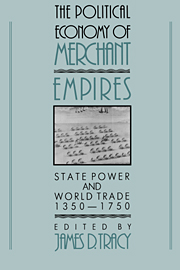Book contents
- Frontmatter
- Contents
- Acknowledgments
- Introduction
- 1 Institutions, Transaction Costs, and the Rise of Merchant Empires
- 2 Merchants and States
- 3 The Rise of Merchant Empires, 1400–1700: A European Counterpoint
- 4 Europe and the Wider World, 1500–1700: The Military Balance
- 5 The Pirate and the Emperor: Power and the Law on the Seas, 1450–1850
- 6 Transport Costs and Long-Range Trade, 1300–1800: Was There a European “Transport Revolution” in the Early Modern Era?
- 7 Transaction Costs: A Note on Merchant Credit and the Organization of Private Trade
- 8 Evolution of Empire: The Portuguese in the Indian Ocean During the Sixteenth Century
- 9 Comparing the Tokagawa Shogunate with Hapsburg Spain: Two Silver-Based Empires in a Global Setting
- 10 Colonies as Mercantile Investments: The Luso-Brazilian Empire, 1500–1808
- 11 Reflections on the Organizing Principle of Premodern Trade
- Selected Bibliography of Secondary Works
- Index
7 - Transaction Costs: A Note on Merchant Credit and the Organization of Private Trade
Published online by Cambridge University Press: 25 March 2010
- Frontmatter
- Contents
- Acknowledgments
- Introduction
- 1 Institutions, Transaction Costs, and the Rise of Merchant Empires
- 2 Merchants and States
- 3 The Rise of Merchant Empires, 1400–1700: A European Counterpoint
- 4 Europe and the Wider World, 1500–1700: The Military Balance
- 5 The Pirate and the Emperor: Power and the Law on the Seas, 1450–1850
- 6 Transport Costs and Long-Range Trade, 1300–1800: Was There a European “Transport Revolution” in the Early Modern Era?
- 7 Transaction Costs: A Note on Merchant Credit and the Organization of Private Trade
- 8 Evolution of Empire: The Portuguese in the Indian Ocean During the Sixteenth Century
- 9 Comparing the Tokagawa Shogunate with Hapsburg Spain: Two Silver-Based Empires in a Global Setting
- 10 Colonies as Mercantile Investments: The Luso-Brazilian Empire, 1500–1808
- 11 Reflections on the Organizing Principle of Premodern Trade
- Selected Bibliography of Secondary Works
- Index
Summary
Douglass North has very ably sketched some of the key problems involved in evaluating the role of declining transaction costs in creating the viability of the commercial networks that held together the merchant empires of early modern Europe. Because there are separate papers in this and the preceding volume on many related topics, particularly shipping, I shall confine my remarks to the problems of smaller-scale commercial firms and credit in the British and French “mercantile empires” of the seventeenth and eighteenth centuries.
By conquest, peaceful penetration, or otherwise, the British and French acquired dominion over considerable territories that, unlike those of the Spanish or Portuguese to the southward, contained no mines of precious metals. Many could, however, with the addition of capital and labor, produce commodities for which they seemed to have a comparative advantage, products, that is, which could be sold advantageously in Europe in exchange for European or Asian products. The principle of comparative advantage did, however, take a long time to work itself out. For the first century after the discovery of America, direct European, primarily Iberian, exchanges with the new wider world were restricted to a fairly limited list of commodities centering on the silver forcibly extracted from Mexico as well as South America and the pepper and spices of the East. A wider range of exchanges began with the Dutch penetration of the Indian Ocean after 1590 and the English and French settlements in North America and the West Indies in the new century.
- Type
- Chapter
- Information
- The Political Economy of Merchant EmpiresState Power and World Trade, 1350–1750, pp. 276 - 297Publisher: Cambridge University PressPrint publication year: 1991
- 12
- Cited by



